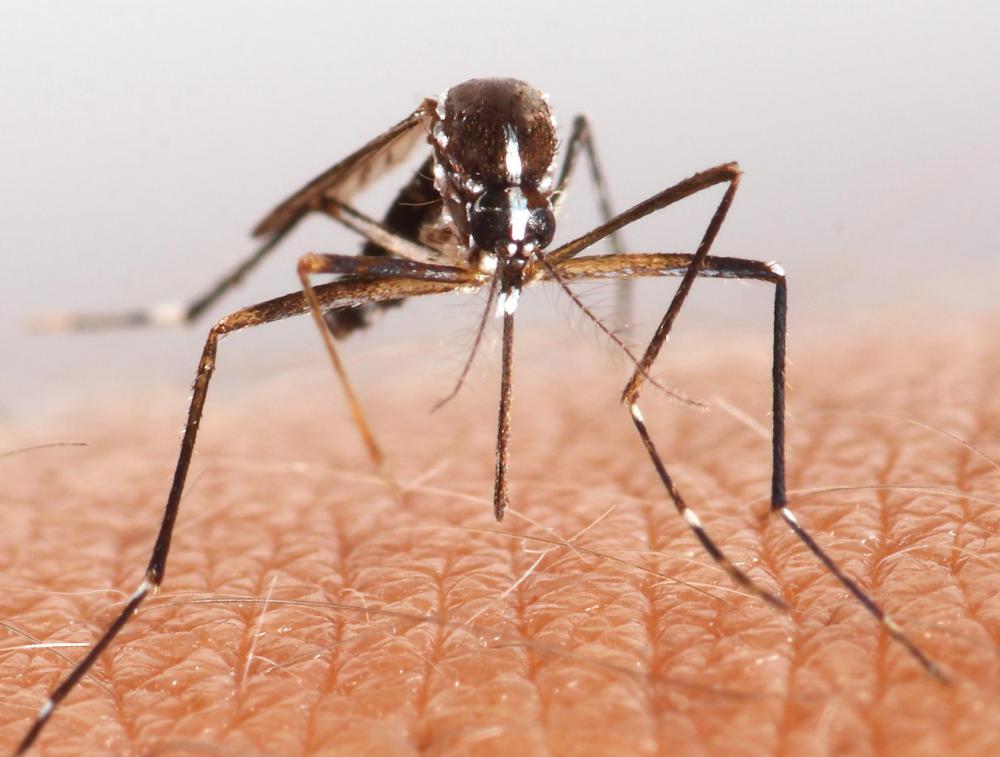At WiseGEEK, we're committed to delivering accurate, trustworthy information. Our expert-authored content is rigorously fact-checked and sourced from credible authorities. Discover how we uphold the highest standards in providing you with reliable knowledge.
What is the Life Cycle of Malaria?
The life cycle of malaria describes the various phases in the development and reproduction of malaria, an infectious disease that is carried by mosquitoes and caused by a variety of protist known as Plasmodium. Five different varieties of Plasmodium are able to infect humans; Plasmodium falciparum tends to cause the most serious cases of the infection. Malaria kills millions of people each year, though it has mostly been controlled in developed countries. Most of the lethal cases of malaria in the world occur in young children in sub-Saharan Africa. High levels of malaria in a given area can be a significant barrier to economic development.
The first stage in the life cycle of malaria occurs when a female anopheles mosquito infected with Plasmodium bites a susceptible person. The infected mosquito will inject elongated, motile cells known as sporozoites into an individual's bloodstream. Upon entering a person's body, the sporozoites more to a person's liver where they divide and multiply into the next stage of the life cycle of malaria — merozoites.

After a period of time ranging from weeks to years, though usually between two weeks and several months, the merozoites leave the liver and enter the host's bloodstream where they infect red blood cells and begin to multiply. The red blood cells burst and release toxins throughout the host's body. During this stage in the life cycle of malaria, symptoms such as fever, chills, and headache begin to present themselves. In severe cases, particularly those involving infection by Plasmodium falciparum, victims may experience hallucinations, coma, and, eventually, death.

There is also a sexual phase in the life cycle of malaria. Some of the merozoites that infect red blood cells do not simply multiply and spread; they instead develop into gametocytes that can produce both male and female gametes, or sex cells. These red blood cells do not rupture; they remain intact and contain the gametocytes. These gametocytes, however, are incapable of producing gametes within a human body, so new Plasmodium cannot form within blood cells.
The next phase of the life cycle of malaria, then, occurs when a mosquito draws blood from an infected individual. The gametocytes are capable of producing gametes within a mosquito's body. The gametocytes produce male and female gametes which combine to form a new generation of sporozoites. Upon biting another person, the mosquito is then able to spread the parasite, infecting a new person with sporozoites and restarting the life cycle of malaria.
AS FEATURED ON:
AS FEATURED ON:












Discussion Comments
@KoiwiGal - It's often a combination of things contributing as well. People don't sleep with mosquito nets (or don't insist their children sleep under them) and they don't remove standing water where mosquitoes can breed.
Then they don't quarantine people who have malaria either, because it's so ubiquitous in some places that it would just be impossible. And malaria symptoms don't continue indefinitely, so there might be people who are infected and spreading the infection but don't realize it.
It's a complicated problem, but hopefully we will make more progress as more and more agencies take it on.
@MrsPramm - Well, it's already a serious problem in a lot of parts of the world. But more encouragingly, it used to be a serious problem in some places but isn't any longer. The Southern United States, for example, has a lot of places where mosquitoes thrive, but they no longer have massive outbreaks of malaria.
Once it comes under a certain level of control, the life cycle of malaria is broken and it becomes more and more difficult for the disease to find a foothold. Since we can actually cure malaria, and have been able to for a while, it isn't a problem for any country that can afford decent medical care. You can even take drugs that will prevent malaria, although they don't always work as well.
The problem is that in a lot of countries most people just can't afford to take the medication and they have to rely on controlling the mosquitoes rather than controlling the disease. And mosquitoes are very difficult to eliminate altogether.
Unfortunately, with climate change expanding the number of places where mosquitoes can exist, we can expect malaria to spread even further in the next few decades. Unless they manage to develop a malaria vaccine or some other way of dealing with it, I'm not sure that it can be stopped. There really aren't any foolproof ways of preventing mosquitoes from ever biting you, so once they start spreading the infection it quickly becomes a serious problem.
Post your comments